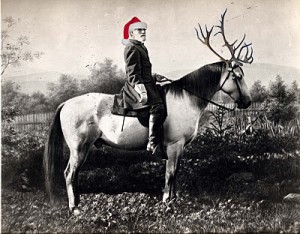Someone has posted this amazing letter written by Harry Hawk, one of the actors performing at the play when Booth shot Lincoln. In fact, he was the only actor onstage when Booth jumped out of the box.
My Dear Parents,
This is the first time I have had to write to you since the assassination of our dear President on Friday night, as I have been in custody nearly ever since, I was one of the principal witnesses of that sad affair, being the only one on the stage at the time of the fatal shot. I was playing Asa Trenchard, in the “American Cousin,” The “old lady” of the theatre had just gone off the stage, and I was answering her exit speech when I heard the shot fired. I turned, looked up at the President’s box, heard the man exclaim, “Sic semper tyrannis,” saw him jump from the box, seize the flag on the staff and drop to the stage; he slipped when he gained the stage, but got upon his feet in a moment, brandished a large knife, saying, “The South shall be free!” turned his face in the direction I stood, and I recognized him as John Wilkes Booth. He ran toward me, and I, seeing the knife, thought I was the one he was after, ran off the stage and up a flight of stairs. He made his escape out of a door, directly in the rear of the theatre, mounted a horse and rode off…
The whole letter can be read after the click.
via How did Lincoln’s assassination affect ticket sales of “Our American Cousin” : AskHistorians.

